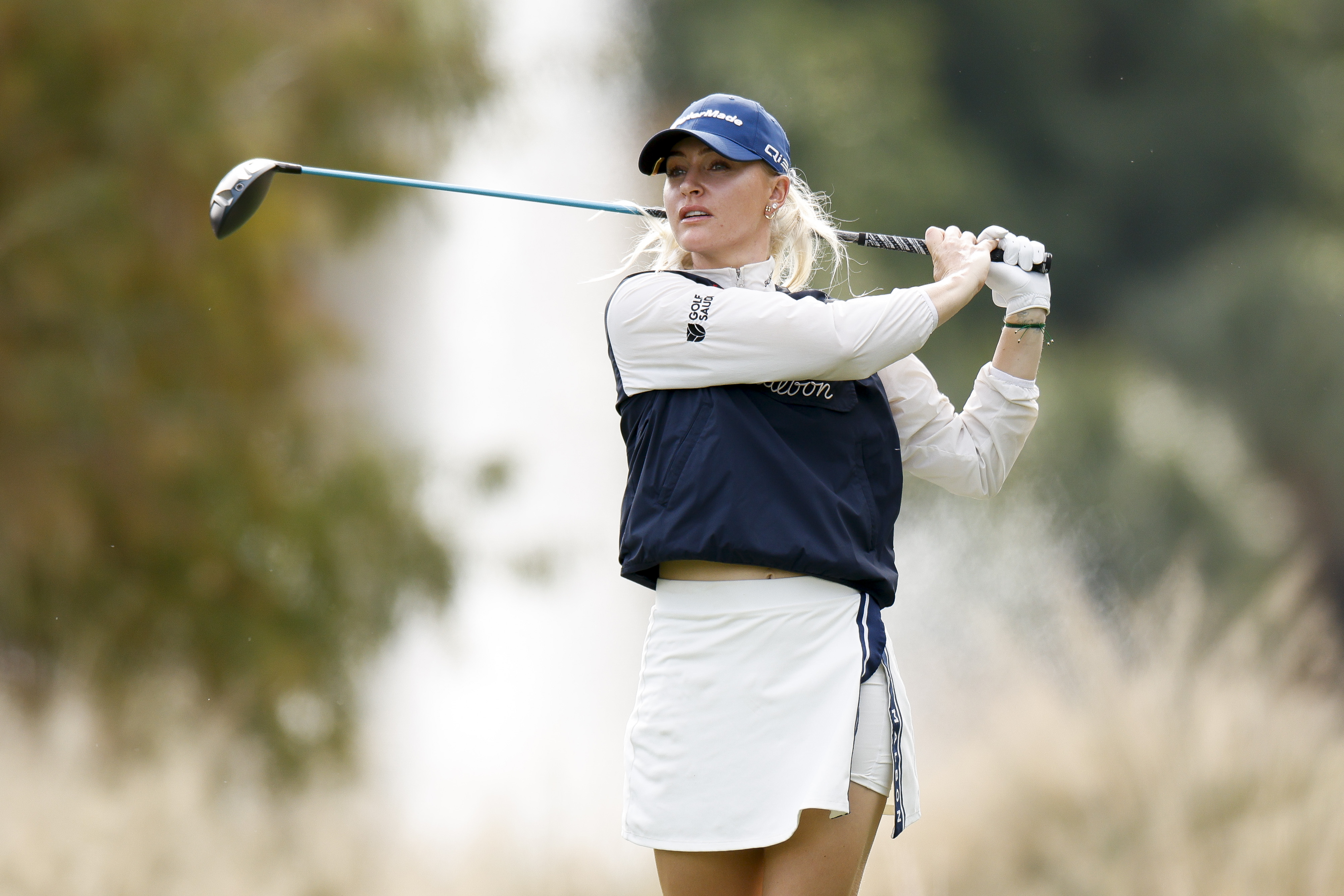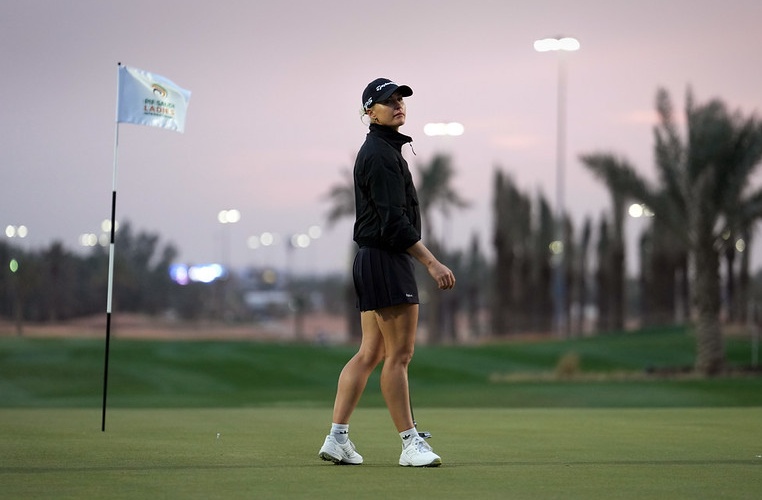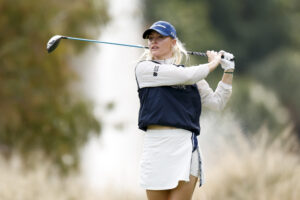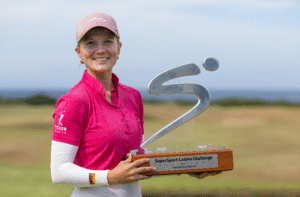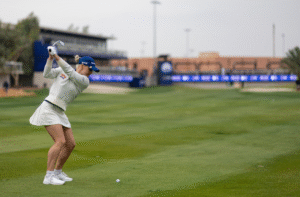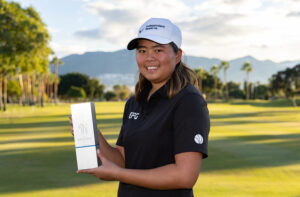 |
COLIN CALLANDER: Ladies and gentlemen, we welcome Mo Martin, the new champion of the Ricoh Women’s British Open.
How does it feel to be the new champion?
MO MARTIN: It’s still soaking in, along with the champagne on my jacket. This is just unbelievable. It’s literally a dream come true.
COLIN CALLANDER: When you arrived here in England at the start of the week, what was your expectation?
MO MARTIN: You know what, I didn’t really have any expectations for this week in particular. I mean, I fell in love with the golf course and I think anybody who enters the championship is trying to win it, and so that was definitely the intention.
But I definitely didn’t expect this.
Q. What was the distance on 18 and did you have any understanding of the significance of how far it could go when you made the putt?
MO MARTIN: The distance, you know what, I’d have to ask my caddie about that. I don’t think I even wrote it down.
COLIN CALLANDER: You described it earlier as a full 3‑wood.
MO MARTIN: Yes, it was definitely a full 3‑wood. I had a little bit of a left‑to‑right lie and also the wind was coming pretty strong.
So I aimed it very far left and hit it full, and held it up a little bit against the wind. Yeah, when it was rolling on the ground, I said “Sit,” and then I said “Go,” and it looked perfect, so I didn’t have anything more to say. It hit the pin and I could hear it hit the pin from the fairway. That was a pretty fun feeling.
Q. Did you think ‑‑
MO MARTIN: No, I didn’t, at the time. I mean, there was so many players behind me, so much golf left to be played. You know, standing on the tee box I was just trying to hit a good drive and that 3‑wood I was just trying to hit to the best of my ability, but no, I wasn’t thinking about it. When it hit the pin, I thought, okay, if that went in, that might have been pretty significant.
COLIN CALLANDER: Any idea how long you hit the drive?
MO MARTIN: No, I don’t know. It was hurting a little bit left‑to‑right. The drive, I don’t know, maybe it went 240 overall.
Q. Were you get information relayed to you when you were on the practise ground about what was happening on the course?
MO MARTIN: No, I didn’t want to know what was happening. I was fully prepared to go into a playoff. I thought maybe I wouldn’t even have that opportunity. But definitely didn’t expect to be the out right champion here. But I was fully prepared to go into a playoff.
I didn’t want realtime updates. I just wanted to get prepared for possibly playing more golf.
Q. Are you a good player in the wind?
MO MARTIN: I love the wind. I mentioned earlier in the week that my first win on Symetra Tour was in El Paso, and winds there were 30‑ to 40‑mile‑per‑hour gusts. They called the tournament for the first time in tour history there.
I love the wind. I love working against the wind and having some fun with it. And Kyle, my caddie, did a really good job of getting great yardages. I mean, I think all week, I probably only hit two or three wrong clubs. I mean, we did a really good job this week.
COLIN CALLANDER: What is Kyle’s second name?
MO MARTIN: Kyle Morrison.
COLIN CALLANDER: Good Scottish name.
Q. Can you talk about your outlook coming into the day after yesterday, and maybe what was rough about yesterday?
MO MARTIN: Yesterday and thinking about it, I mean, I had a rough patch in there, but I played a lot better than I scored yesterday. And it was a learning curve for me. I had a camera behind me every single shot I hit. That was a first.
So I think it was just a little bit harder to focus yesterday. So today I just wanted to learn the most I could from that and continue on. But strategy‑wise, game‑wise, nothing was different.
Q. Can you talk about your transition to a standard length putter and when that happened?
MO MARTIN: That actually happened at St. Andrews last year. My coach, Ian Triggs ‑‑ I actually just picked up a short putter and I rolled a few with it, and I think I made three in a row. My coach just started laughing and I said, “What are you laughing at?”
And he said, “Your stroke’s better with the short putter.”
So I said, “Okay.”
He said, “Whenever you’re ready, you’ll know when.” He said, “I’m behind you a 100 per cent. Go for it.” He said, “Whenever you’re ready.”
Well, actually, I’ve used a couple times, just a couple rounds over my life. But I put it in for the Beijing event last year in China, and I think I had like 25 putts for a couple days in a row, which is a pretty good transition.
Callaway had putters out, so I think I may have actually picked up the putter I’m using now, the Tank, the Odyssey Tank. I rolled a few just to see what he thought because I knew I would have to make that transition coming up in the future and I just didn’t know when I was going to do it.
So I just wanted to see what he thought. I don’t have him out here all the time. He only comes out to a couple events. I wanted his eyes when I had them.
Q. I appreciate you’ve not had much time to think about this, but what will you do to celebrate?
MO MARTIN: You know what, I have no idea. I’m going to have to tell you that tomorrow. I was just planning on driving to Manchester and having a quiet dinner and flying out tomorrow morning.
Q. Quick look ahead to next year, have you ever played Turnberry?
MO MARTIN: No, I haven’t.
Q. But you’ll be there?
MO MARTIN: Yes, God willing.
Q. Have you thought of what this is going to do for your career?
MO MARTIN: No. I mean, I’m just grateful for having the career I have. I mean, I’m just grateful for ‑‑ I mean, I live the dream every day. No, I haven’t thought about much at all.
Q. Have you made any calls home yet?
MO MARTIN: No, I haven’t. I haven’t even looked at my phone since this morning. I’m sure I’m going to have a lot of messages from a lot of people. And I’m very fortunate, I have so much support. Over the years, so many people have come together to help me when I needed it. I’m very fortunate.
Q. You’re probably not aware of this, but, in fact, at the end of this month, this club celebrates 125 years of its existence, so this is a particularly special month for us, as it is for you, and thank you very much for marking it in a very dramatic way.
MO MARTIN: It’s been a pleasure. I’m honoured.
Q. You’ve talked a lot about support today. Can you give us an example: Financial, emotional, can you give any specific examples of what’s meant a lot to you?
MO MARTIN: We didn’t have a lot of money growing up. My dad taught me from Hogan’s Five Lessons, and he built a cage in our driveway. So we couldn’t afford lessons. So he knew it was going to be a great sport, so he taught my brother and I.
So just financially speaking, a lot of people throughout the years came together to help me continue playing. So I mean, I wish I could thank everybody right now but they absolutely know who they are; just to get me into junior tournaments and to help me travel, and the opportunity to walk on at UCLA. My grandma helped me through that first year. So many people have come together.
Q. As long as it took you to get out here to the LPGA, was there ever a moment where you almost quit or almost couldn’t go on, I guess?
MO MARTIN: I guess, yeah, I had ‑‑ three things were my criteria to keep playing: I thought if I still woke up and I was happy in the morning; if I was still contributing to the women’s game and growing it; and three, if I was paying my own bills. So that was my criteria. Those are my three things.
So as long as I was accomplishing those, then I was going to keep playing.
Q. Did you almost not be able to pay bills or did you almost wake up grumpy?
MO MARTIN: Everybody has those days (laughing).
Q. I think you took care of all three of those today. How did you hook up with Triggsy?
MO MARTIN: That’s a funny story. Let’s see, when was it ‑‑ two years ago, the Australian Open before this ‑‑ so, yeah, last year. This is my second season working with him.
I didn’t have a good week and I was just frustrated with my ball‑striking, and I was hitting balls on range. He was there, of course. He has a lot of Australian players and other players out here. I wanted to just see if he would have five minutes.
I remember I wanted to do it but I was a little bit shy and I was like, this is kind of awkward. And Kyle said ‑‑ he had said to me, specifically, my caddie, he said, “Do it. You won’t regret it.”
I said, okay, fine. I just went over and said, “Hi, I’m Mo Martin.”
And he was so polite. He took off hit hat and said, “Hi, I’m Ian Triggs.”
I said, “Do you have five minutes?” I said, “Would you take a look?”
And he said he was quite busy, but he said, “If you’ll be here this afternoon,” he’ll come back.
So I really want to thank him for taking a chance on me, too.
COLIN CALLANDER: You mentioned your grandfather the other day. Am I right in saying he was 101 when he passed away?
MO MARTIN: 102.
COLIN CALLANDER: What was his name?
MO MARTIN: Lincoln Martin. He was born on Lincoln’s Day, 2/12/1912, and so he was named after Lincoln.
COLIN CALLANDER: And he played a special part in your life?
MO MARTIN: Yeah, he changed my life. He made everything so much brighter and better. I miss him but I’m so grateful that I had the time I had with him. I’m incredibly blessed.
Q. I hope this isn’t a bad question but I read a story in San Diego a couple years ago that when you first met him, you walked in into his room that there was a shrine that you didn’t know existed.
MO MARTIN: Yeah, family dynamics are funny. My dad didn’t really have a relationship with him. My grandpa didn’t agree with some things he did.
So when my dad passed away when I was 19, I knew my grandpa was somebody I really wanted to get to know. So I made a trip up to his ranch and I walked into his office and there were newspaper articles and pictures. I started crying, I was overwhelmed, because I didn’t know he was that involved in my life. Like he was just a silent follower, but he was caring and loving me all the time.
Q. What did you know about him that made you want to get to know him since you had no real connection with him?
MO MARTIN: He was very kind, very gentle. I don’t know, I guess just a feeling.
Q. And since his passing in March, what’s going on at his house or his ranch? Is the shrine still there?
MO MARTIN: His ranch is still there, and this win will definitely help keep it in the family, which has been absolutely ‑‑ it’s been what I wanted to happen.
We weren’t quite sure we were going to be able to keep the ranch, but it’s a very special place for me. It kind of my sanctuary, and it’s nice to have all the memories that I have with grandpa and it’s an incredible place. It’s in Porterville, California, sleepy town.
My aunt marry did a tremendous thing and she made the big effort, I think it’s almost finalised, to keep it in the family. But I will definitely be able to help keep it now; and we need a new roof and things like that.
Q. I’m sure you’ve managed hundreds of albatrosses in practise rounds; is that as close as you’ve come in a competitive tournament?
MO MARTIN: 100 per cent, definitely.
A friend of mine and fellow competitor, Vikki Laing, made a 2 on 17 a couple days ago, so maybe I had that in my mind.
Q. She’s a pal of yours?
MO MARTIN: A friend of mine. She plays on the LET. She was competing this week.
Q. But that’s as close ‑‑ a double‑eagle?
MO MARTIN: Correct.
Q. A moment like this, do you think you appreciate it all the much more considering that you didn’t turn pro at 18, superstar out of college, boom, here you are type thing?
MO MARTIN: You know what, that’s hard to say. It definitely lowered my expectations, but I think I’m ‑‑ I mean, I don’t know if this was my family or just my upbringing or me. I’m so grateful like for everything; for the challenges, for the failures, for the successes.
I just want to say that there are so many amazing people in this world, and not enough is said about the good people and the good deeds, and so many people do things unspoken, unspoken kindness. So many people have helped me when I’ve needed it. I’ve definitely had a few angels in my life.
COLIN CALLANDER: Mo, thank you very much and see you at Turnberry.
MO MARTIN: I look forward to coming back.
